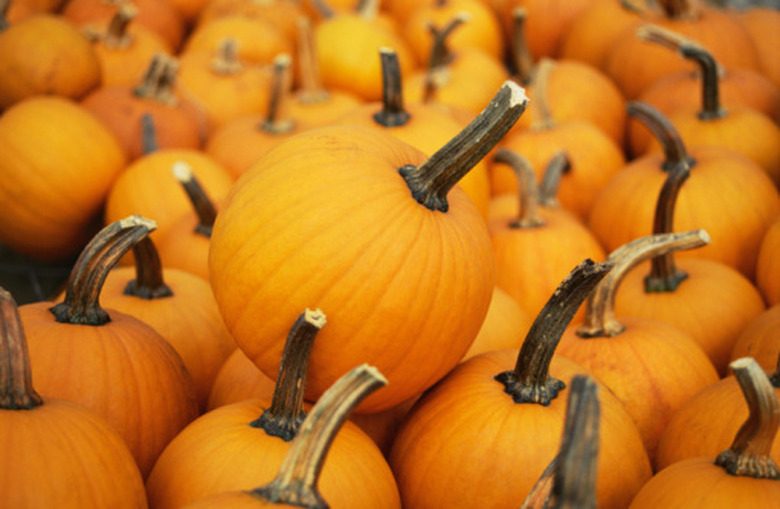How To Get Rid Of White Mold Growing On My Pumpkin Plant
Whether you are growing pumpkins as a part of an edible garden or if you have annual plans for a pumpkin patch, your cucurbits may display white mold growth as a symptom of a severe problem. White mold disease of pumpkins is distinguishable from other diseases by the black fruiting bodies that grow within the white, cotton-like mold. Caused by the fungus Sclerotinia sclerotiorum, the disease causes your pumpkins to quickly rot once infected. Beginning near the stem and traveling outward, watery areas of fruit collapse as a result of decay.
Step 1
Recognize that once white mold has infected your pumpkin plant, though you can physically scrape away the white mold growth, these plants are beyond saving. Aim for the goal of saving your remaining pumpkins and eradicating this disease from your gardening space.
Step 2
Use drip irrigation instead of overhead irrigation as the standing moisture on pumpkin plants encourages fungal growth of white mold. Irrigate only during dry periods as pumpkins tolerate hot temperatures and arid climates, but wet conditions increase the likelihood of infection.
- Whether you are growing pumpkins as a part of an edible garden or if you have annual plans for a pumpkin patch, your cucurbits may display white mold growth as a symptom of a severe problem.
- Recognize that once white mold has infected your pumpkin plant, though you can physically scrape away the white mold growth, these plants are beyond saving.
Step 3
Avoid wounding pumpkins as these openings act as entry points for fungal pathogens.
Step 4
Remove and destroy pumpkins infected with white mold. Avoid planting other highly susceptible plants like cabbage or beans, which can promote spreading or re-introduce fungal disease to your pumpkins.
Step 5
Rotate your pumpkin crops to corn or grass in order to move pumpkins out of potentially infested soil unless only a few pumpkins are infected and removed.
Step 6
Ensure that pumpkins are planted with sufficient space between plants in rows spaced 10 to 15 feet apart as open growth decreases the likelihood of infection.
Pumpkin Stop Growing?
Pumpkins grow in warm, frost-free weather, with most varieties taking 95 to 120 days to reach maturity and stop growing. A pumpkin is ready for harvest when the fruit reaches its full color for the variety and the rind is too hard to pierce easily with a fingernail. Providing 1 to 2 inches of water weekly is usually sufficient for healthy growth. Disease and pest problems can lead to poor or stunted growth, resulting in small pumpkins that stop growing before they reach full maturity. Keeping the garden free of weeds, rotating garden beds each year, and treating aphid infestations with a ready-to-use insecticidal soap spray at five-day intervals minimizes the spread of disease. Powdery mildew can stunt plants and reduce yields.
- Avoid wounding pumpkins as these openings act as entry points for fungal pathogens.
- Disease and pest problems can lead to poor or stunted growth, resulting in small pumpkins that stop growing before they reach full maturity.
Tip
Always wear gardening gloves when handling mold and sanitize hands and clothing before handling uninfected plants.
References
- University of Minnesota Extension: Diseases of Cucurbits
- Rutgers Cooperative Research & Extension: Diagnosing and Managing Important Pumpkin Diseases in the Home Garden – Part 2
- Cornell University Plant Pathology Department: Fruit Rots of Squash and Pumpkins
- University of Illinois Extension: Growing Pumpkins
- University of California Extension: Pumpkins
- University of Nebraska Extension: Harvesting and Storing Pumpkins
- Harvest to Table: How to Grow Pumpkin
